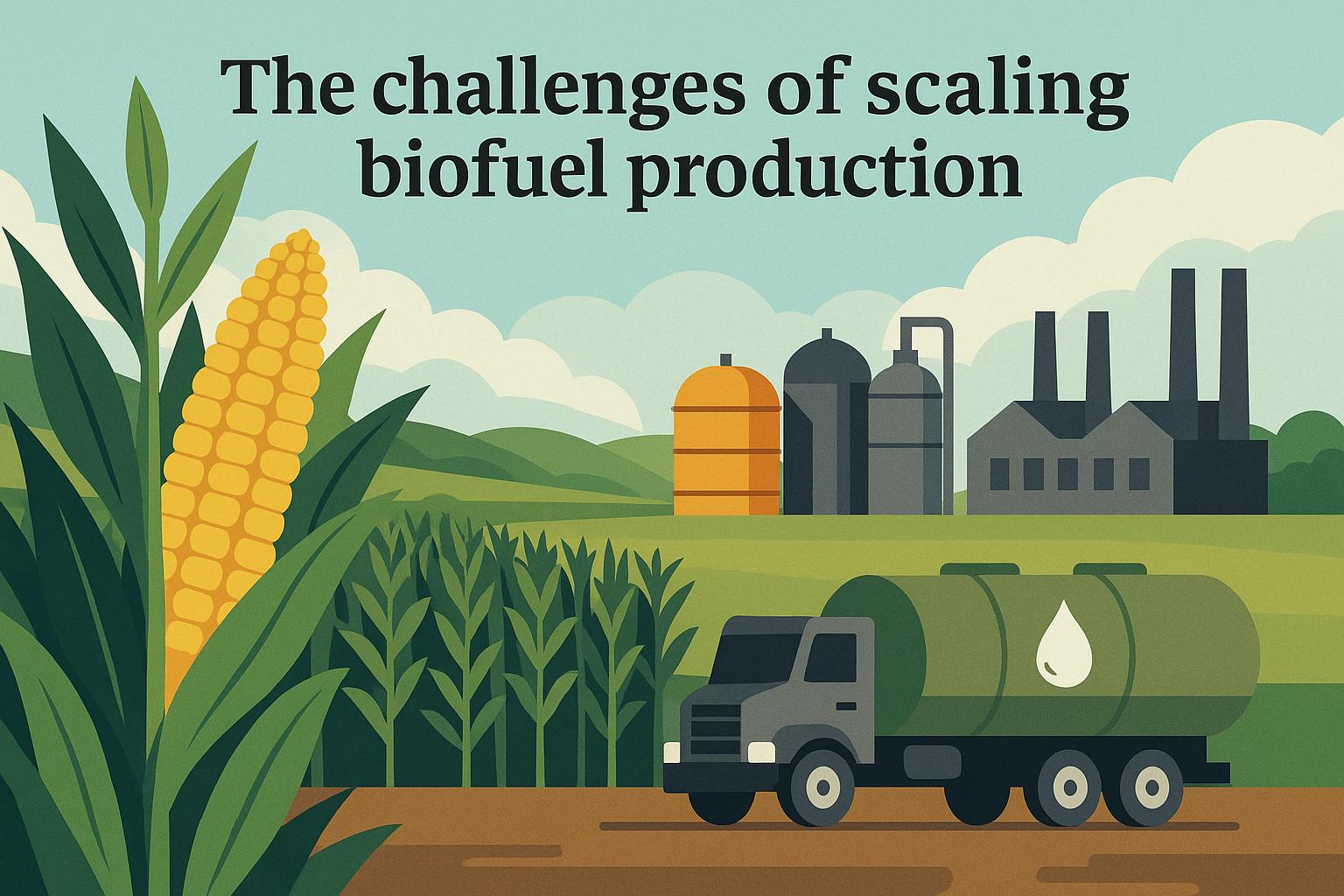The Challenges of Scaling Biofuel Production
The global energy landscape is continually shifting as the world seeks sustainable alternatives to conventional fossil fuels. Among the array of potential options, biofuels stand out as a promising candidate due to their renewable nature and potential to reduce carbon emissions. However, the move from small-scale experimentations and demonstrations of biofuel production to full-fledged industrial-scale operations presents significant hurdles that are both intricate and multifaceted. This piece seeks to delve deeper into these challenges by running through various integral aspects impacting the scalability of biofuel production.
Feedstock Limitations
One of the most pressing challenges when considering the scaling of biofuel production is the sourcing and sustainability of feedstock. Biofuels are derived from a variety of organic materials including, but not limited to, corn, sugarcane, and vegetable oils. However, a core issue that arises is the competition between these resources and those required for food production. This competition not only impacts food prices but also raises ethical concerns regarding the allocation of land and resources. Furthermore, the reliance on food-based feedstocks poses economic challenges due to the volatility of agricultural markets.
To address these challenges, there is considerable ongoing research on maximizing yield from non-food-based sources, such as algae and waste biomass, which do not compete with food supplies. Algae, for instance, is a highly efficient producer of oil and can be cultivated in conditions where traditional crops cannot thrive. Similarly, waste biomass, which includes byproducts from various industries, offers a sustainable feedstock option. Both sources, however, require advancements in cultivation, harvesting, and processing technologies to become economically viable on a large scale.
Technological Constraints
Scaling biofuel production is not merely a matter of increasing the quantity of feedstock but also involves overcoming significant technological hurdles associated with the conversion processes. Current technological approaches, such as hydrolysis, fermentation for ethanol, and transesterification for biodiesel, tend to be energy-intensive and costly. These processes often require expensive catalysts and substantial energy inputs. Besides, the conversion efficiency in transforming raw biomass into usable fuels has room for improvement.
To surmount these challenges, innovation in enzyme technology and process optimization is vital. By improving enzyme effectiveness or developing new catalysts that work efficiently under less demanding conditions, costs can be minimized, and output can be maximized. Tailored research and development focusing on refining these processes hold the keys to achieving economically viable production models at a larger scale.
Infrastructure and Distribution
Another major consideration in scaling biofuel production lies in the logistics of transporting and distributing these fuels. The existing infrastructure is predominantly geared towards fossil fuels, meaning significant investment is required to adapt current systems or develop new ones tailored for biofuels. Transporting biofuels efficiently from production sites to consumption areas involves costs that can be prohibitive without appropriate systems in place.
One potential solution lies in the establishment of regional bio-refineries, which can curtail transportation expenses by processing the raw materials closer to the source and end-user. However, this approach demands hefty investment and policy incentives to become viable. Policy support, particularly in the form of subsidies or grants, could make such regional plants feasible, presenting an opportunity to align distribution networks with new production paradigms.
Economic Viability
Economic viability remains a linchpin of large-scale biofuel adoption. The production costs of biofuels can often exceed those of fossil fuels, making them less attractive in the absence of governmental support. Moreover, the innate volatility of oil prices further complicates the economic landscape, as fluctuations can abruptly alter market dynamics and lead to investment uncertainty within the biofuel sector.
Government subsidies and incentives are instrumental in leveling the economic playing field, encouraging both research and infrastructure development. By reducing the financial barriers involved, these incentives can spur investment into necessary technologies and facilities, fostering a more conducive environment for biofuel market penetration.
Regulatory Challenges
Navigating the regulatory landscape is crucial when scaling biofuel production. The policy frameworks that govern the sector are often complex and differ widely from one region to another. Compliance with these regulations is essential, covering areas such as emissions standards, land use, sustainability metrics, and more.
To navigate this framework effectively, producers must be well-versed in pertinent regulations and proactive in ensuring compliance. Establishing clear communication and partnerships with regulatory bodies can also help in aligning biofuel production goals with legislative contexts.
Environmental Concerns
Environmental considerations are inevitable when discussing alternatives to traditional fuel sources, and biofuels, despite their potential benefits, are not without their drawbacks. The production of biofuels can lead to adverse environmental impacts, including deforestation, increased water usage, and biodiversity loss. These areas require careful examination and management to ensure that the shift to biofuel does not inadvertently exacerbate environmental issues.
Advanced lifecycle analysis provides a means of better understanding and mitigating the environmental impacts associated with biofuel production. By integrating sustainability considerations into every step of the production and distribution process, biofuels could more effectively fulfill their promise as a greener alternative to fossil fuels.
Conclusion
In summary, scaling biofuel production involves a delicate balance of various technical, economic, and regulatory considerations. Achieving this balance necessitates a multidisciplinary approach that fosters innovations in technology, proactive regulation, and strategic economic incentives. Ensuring cross-industry collaboration alongside governmental support is crucial for navigating these challenges. As the global energy landscape continues its transition towards sustainable alternatives, ongoing research and development in the biofuel sector remain paramount for realizing future advancements and contributions towards a lower-carbon future.


